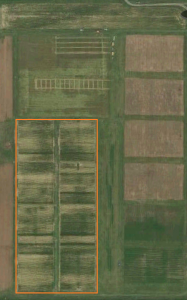This summer I am interning within the Cornell Nutrient Management Spear Program working on the Sustainable Dairy Project. We are looking at the effects of N-based and P-based liquid manure and dairy composted manure solid application on soil health. Dairy manure and composted manure solids are often distributed over fields according to the nitrogen demand. This, however, often leads to excess phosphorous being added to the soil. This phosphorous is often leached, ultimately leading to eutrophication. By adding manure and composted solids to fields based on the phosphorus requirements (instead of nitrogen requirements), we can reduce leaching of phosphorus.

Aerial Image of our plots at the Musgrave Research Farm- Aurora, NY Photo compliment of Google Earth
Previous studies with this program have shown that these applications do not fulfill the nutritional needs of the plants and many crops under these treatments show signs of nitrogen limitation. It has, therefore, been recommended that nitrogen fertilizers be added as a supplementation to fulfill those needs. This program has studied this concept for over 15 years on the same plots at the Musgrave Research Farm. This summer, we will be looking at soil health in the current alfalfa rotation.
I started off my internship by reading through previous and related studies on this matter to familiarize myself with what is known and yet to be known about the switch from N to P-based management, manure management, and greenhouse gas emissions from manure applications. Soil samples were retrieved in April, before planting. We then sieved and ground soil samples after drying. Now that this dirty work was out of the way, we could start to experiment!
